Don't wanna be here? Send us removal request.
Text
The Invention of Capitalism: How a Self-Sufficient Peasantry was Whipped Into Industrial Wage Slaves
[ Original article here: https://sustainablehuman.minds.com/blog/view/662863197279100930 ]
Words by Yasha Levine
“…everyone but an idiot knows that the lower classes must be kept poor, or they will never be industrious.”
—Arthur Young; 1771
Our popular economic wisdom says that capitalism equals freedom and free societies, right? Well, if you ever suspected that the logic is full of shit, then I’d recommend checking a book called The Invention of Capitalism, written by an economic historian named Michael Perelmen, who’s been exiled to Chico State, a redneck college in rural California, for his lack of freemarket friendliness. And Perelman has been putting his time in exile to damn good use, digging deep into the works and correspondence of Adam Smith and his contemporaries to write a history of the creation of capitalism that goes beyond superficial The Wealth of Nations fairy tale and straight to the source, allowing you to read the early capitalists, economists, philosophers, clergymen and statesmen in their own words. And it ain’t pretty.
One thing that the historical record makes obviously clear is that Adam Smith and his laissez-faire buddies were a bunch of closet-case statists, who needed brutal government policies to whip the English peasantry into a good capitalistic workforce willing to accept wage slavery.
Francis Hutcheson, from whom Adam Smith learned all about the virtue of natural liberty, wrote: ”it is the one great design of civil laws to strengthen by political sanctions the several laws of nature. … The populace needs to be taught, and engaged by laws, into the best methods of managing their own affairs and exercising mechanic art.”
Yep, despite what you might have learned, the transition to a capitalistic society did not happen naturally or smoothly. See, English peasants didn’t want to give up their rural communal lifestyle, leave their land and go work for below-subsistence wages in shitty, dangerous factories being set up by a new, rich class of landowning capitalists. And for good reason, too. Using Adam Smith’s own estimates of factory wages being paid at the time in Scotland, a factory-peasant would have to toil for more than three days to buy a pair of commercially produced shoes. Or they could make their own traditional brogues using their own leather in a matter of hours, and spend the rest of the time getting wasted on ale. It’s really not much of a choice, is it?
But in order for capitalism to work, capitalists needed a pool of cheap, surplus labor. So what to do? Call in the National Guard!
Faced with a peasantry that didn’t feel like playing the role of slave, philosophers, economists, politicians, moralists and leading business figures began advocating for government action. Over time, they enacted a series of laws and measures designed to push peasants out of the old and into the new by destroying their traditional means of self-support.
“The brutal acts associated with the process of stripping the majority of the people of the means of producing for themselves might seem far removed from the laissez-faire reputation of classical political economy,” writes Perelman. “In reality, the dispossession of the majority of small-scale producers and the construction of laissez-faire are closely connected, so much so that Marx, or at least his translators, labeled this expropriation of the masses as ‘‘primitive accumulation.’’
Perelman outlines the many different policies through which peasants were forced off the land—from the enactment of so-called Game Laws that prohibited peasants from hunting, to the destruction of the peasant productivity by fencing the commons into smaller lots—but by far the most interesting parts of the book are where you get to read Adam Smith’s proto-capitalist colleagues complaining and whining about how peasants are too independent and comfortable to be properly exploited, and trying to figure out how to force them to accept a life of wage slavery.
This pamphlet from the time captures the general attitude towards successful, self-sufficient peasant farmers:
The possession of a cow or two, with a hog, and a few geese, naturally exalts the peasant. . . . In sauntering after his cattle, he acquires a habit of indolence. Quarter, half, and occasionally whole days, are imperceptibly lost. Day labour becomes disgusting; the aversion in- creases by indulgence. And at length the sale of a half-fed calf, or hog, furnishes the means of adding intemperance to idleness.
While another pamphleteer wrote:
Nor can I conceive a greater curse upon a body of people, than to be thrown upon a spot of land, where the productions for subsistence and food were, in great measure, spontaneous, and the climate required or admitted little care for raiment or covering.
John Bellers, a Quaker “philanthropist” and economic thinker saw independent peasants as a hindrance to his plan of forcing poor people into prison-factories, where they would live, work and produce a profit of 45% for aristocratic owners:
“Our Forests and great Commons (make the Poor that are upon them too much like the Indians) being a hindrance to Industry, and are Nurseries of Idleness and Insolence.”
Daniel Defoe, the novelist and trader, noted that in the Scottish Highlands “people were extremely well furnished with provisions. … venison exceedingly plentiful, and at all seasons, young or old, which they kill with their guns whenever they find it.’’
To Thomas Pennant, a botanist, this self-sufficiency was ruining a perfectly good peasant population:
“The manners of the native Highlanders may be expressed in these words: indolent to a high degree, unless roused to war, or any animating amusement.”
If having a full belly and productive land was the problem, then the solution to whipping these lazy bums into shape was obvious: kick ‘em off the land and let em starve.
Arthur Young, a popular writer and economic thinker respected by John Stuart Mill, wrote in 1771: “everyone but an idiot knows that the lower classes must be kept poor, or they will never be industrious.” Sir William Temple, a politician and Jonathan Swift’s boss, agreed, and suggested that food be taxed as much as possible to prevent the working class from a life of “sloth and debauchery.”
Temple also advocated putting four-year-old kids to work in the factories, writing ‘‘for by these means, we hope that the rising generation will be so habituated to constant employment that it would at length prove agreeable and entertaining to them.’’ Some thought that four was already too old. According to Perelmen, “John Locke, often seen as a philosopher of liberty, called for the commencement of work at the ripe age of three.” Child labor also excited Defoe, who was joyed at the prospect that “children after four or five years of age…could every one earn their own bread.’’ But that’s getting off topic…
Happy Faces of Productivity…
Even David Hume, that great humanist, hailed poverty and hunger as positive experiences for the lower classes, and even blamed the “poverty” of France on its good weather and fertile soil:
“‘Tis always observed, in years of scarcity, if it be not extreme, that the poor labour more, and really live better.”
Reverend Joseph Townsend believed that restricting food was the way to go:
“[Direct] legal constraint [to labor] . . . is attended with too much trouble, violence, and noise, . . . whereas hunger is not only a peaceable, silent, unremitted pressure, but as the most natural motive to industry, it calls forth the most powerful exertions. . . . Hunger will tame the fiercest animals, it will teach decency and civility, obedience and subjugation to the most brutish, the most obstinate, and the most perverse.”
Patrick Colquhoun, a merchant who set up England’s first private “preventative police“ force to prevent dock workers from supplementing their meager wages with stolen goods, provided what may be the most lucid explanation of how hunger and poverty correlate to productivity and wealth creation:
Poverty is that state and condition in society where the individual has no surplus labour in store, or, in other words, no property or means of subsistence but what is derived from the constant exercise of industry in the various occupations of life. Poverty is therefore a most necessary and indispensable ingredient in society, without which nations and communities could not exist in a state of civilization. It is the lot of man. It is the source of wealth, since without poverty, there could be no labour; there could be no riches, no refinement, no comfort, and no benefit to those who may be possessed of wealth.
Colquhoun’s summary is so on the money, it has to be repeated. Because what was true for English peasants is still just as true for us:
“Poverty is therefore a most necessary and indispensable ingredient in society…It is the source of wealth, since without poverty, there could be no labour; there could be no riches, no refinement, no comfort, and no benefit to those who may be possessed of wealth.”
9 notes
·
View notes
Text
Reality Check
The other night I phoned a former Republican member of Congress with whom I’d worked in the 1990s on various pieces of legislation. I consider him a friend. I wanted his take on the Republican candidates because I felt I needed a reality check. Was I becoming excessively crotchety and partisan, or are these people really as weird as they seem? We got right into it:
Me: “So what do really you think of these candidates?”
Him: “You want my unvarnished opinion?”
Me: "Please. That’s why I called.”
Him: “They’re all nuts.”
Me: “Seriously. What do you really think of them?”
Him: “I just told you. They’re bonkers. Bizarre. They’re like a Star Wars bar room.”
Me: “How did it happen? How did your party manage to come up with this collection?”
Him: “We didn’t. They came up with themselves. There’s no party any more. It’s chaos. Anybody can just decide they want to be the Republican nominee, and make a run for it. Carson? Trump? They’re in the lead and they’re both out of their f*cking minds.”
Me: “That’s not reassuring.”
Him: “It’s a disaster. I’m telling you, if either of them is elected, this country is going to hell. The rest of them aren’t much better. I mean, Carly Fiorina? Really? Rubio? Please. Ted Cruz? Oh my god. And the people we thought had it sewn up, who are halfway sane – Bush and Christie – they’re sounding almost as batty as the rest.”
Me: “Who’s to blame for this mess?”
Him: “Roger Ailes, David and Charles Koch, Rupert Murdoch, Rush Limbaugh. I could go on. They’ve poisoned the American mind and destroyed the Republican Party.
Me: "Nice talking with you.”
Him: “Sleep well.”
6K notes
·
View notes
Audio
Why does this exist? Listen to RotL Ep. 145, 30:35 in.
I totally didn’t follow John’s instructions*, but I totally did lose half a day playing around with this. And yet it still seems like I drank episode 145 down quickly, then sneezed a portion of it out onto a wall, creating the senseless mix you now hear. -DJ
*I pitch shifted and edited everything, then listed back to John and realised I’d done THE WRONG THING (I didn’t time-stretch the audio) and by then it was 3pm and I still hadn’t stirred my gravy pot. And after that, I decided to put it up on the internet anyway, because internet, and also because ignoring Sunken Cost Fallacy. :)
Created under a LG-BT-QIA Creative Commons License.
85 notes
·
View notes
Quote
Of all the evils of which you complain there is really only one – the fact that you do complain. There is no misery unless there is something in the universe which you think is miserable. The only thing unendurable is yourself on the day you think something unendurable. Injury, illness, and setback are part of our lot. Such affairs come by order and not by accident and, therefore, are not common, but inevitable. When disease and injury seek you out, do not pray to be spared from these ills. Instead you should ask for what others fear to request. Ask for uncertainty and disquietude – for each is a test of your discipline and forbearance. Ask for turmoil and brawl – for therein lies the foundation for vigor and fortitude. Ask that upon receipt of these things you have the strength to keep on fighting – for such is the secret of relentless forward progress. And above all else, ask to have these trials always – for you will not always have the courage to ask for them. All things which cause us to groan or recoil are part of the tax of life. These things you should never hope or seek to escape. Life is a battle, and to live is to fight.
- Mashup of Seneca and Commando’s Prayer by reddit user VivereMilitare (via frugalstoic)
8 notes
·
View notes
Photo

Leonardo #tmnt #leonardo #teenagemutantninjaturtles #daverapoza #sketch daverapoza.com
612 notes
·
View notes
Photo


I know you haven’t bought any prints of my birds because you couldn’t decide which one to get. Well, no need to choose just one, because now they are all available ON ONE PRINT! Not sure what a bird is called? Not sure what bird is for a particular state? I’ve got you covered! A Print with the states and bird names IS ALSO AVAILABLE! Great for educational purposes!
Many different sizes available now on Society6: here here (with names) and on my deviantART: here here (with names)
I only make a couple bucks from these sites for each sale, so if you’d like less of your money to go to these websites and more to go to me, just message me and I’m sure we can work something out. That goes for any of the individual bird prints as well.
Thank you for looking!
87 notes
·
View notes
Text
Back to the Nineteenth Century
My recent column about the growth of on-demand jobs like Uber making life less predictable and secure for workers unleashed a small barrage of criticism that workers get what they’re worth in the market.
A Forbes Magazine contributor, for example, writes that jobs exist only “when both employer and employee are happy with the deal being made.” So if the new jobs are low-paying and irregular, too bad.
Much the same argument was voiced in the late nineteenth century over alleged “freedom of contract.” Any deal between employees and workers was assumed to be fine if both sides voluntarily agreed to it.
It was an era when many workers were “happy” to toil twelve-hour days in sweat shops for lack of any better alternative.
It was also a time of great wealth for a few and squalor for many. And of corruption, as the lackeys of robber barons deposited sacks of cash on the desks of pliant legislators.
Finally, after decades of labor strife and political tumult, the twentieth century brought an understanding that capitalism requires minimum standards of decency and fairness – workplace safety, a minimum wage, maximum hours (and time-and-a-half for overtime), and a ban on child labor.
We also learned that capitalism needs a fair balance of power between big corporations and workers.
We achieved that through antitrust laws that reduced the capacity of giant corporations to impose their will, and labor laws that allowed workers to organize and bargain collectively.
By the 1950s, when 35 percent of private-sector workers belonged to a labor union, they were able to negotiate higher wages and better working conditions than employers would otherwise have been “happy” to provide.
But now we seem to be heading back to nineteenth century.
Corporations are shifting full-time work onto temps, free-lancers, and contract workers who fall outside the labor protections established decades ago.
The nation’s biggest corporations and Wall Street banks are larger and more potent than ever.
And labor union membership has shrunk to less than 6 percent of the private-sector workforce.
So it’s not surprising we’re once again hearing that workers are worth no more than what they can get in the market.
But as we should have learned a century ago, markets don’t exist in nature. They’re created by human beings. The real question is how they’re organized and for whose benefit.
In the late nineteenth century they were organized for the benefit of a few at the top.
But by the middle of the twentieth century they were organized for the vast majority.
During the thirty years after the end of World War II, as the economy doubled in size, so did the wages of most Americans — along with improved hours and working conditions.
Yet since around 1980, even though the economy has doubled once again (the Great Recession notwithstanding), the wages most Americans have stagnated. And their benefits and working conditions have deteriorated.
This isn’t because most Americans are worth less. In fact, worker productivity is higher than ever.
It’s because big corporations, Wall Street, and some enormously rich individuals have gained political power to organize the market in ways that have enhanced their wealth while leaving most Americans behind.
That includes trade agreements protecting the intellectual property of large corporations and Wall Street’s financial assets, but not American jobs and wages.
Bailouts of big Wall Street banks and their executives and shareholders when they can’t pay what they owe, but not of homeowners who can’t meet their mortgage payments.
Bankruptcy protection for big corporations, allowing them to shed their debts, including labor contracts. But no bankruptcy protection for college graduates over-burdened with student debts.
Antitrust leniency toward a vast swathe of American industry – including Big Cable (Comcast, AT&T, Time-Warner), Big Tech (Amazon, Google), Big Pharma, the largest Wall Street banks, and giant retailers (Walmart).
But less tolerance toward labor unions — as workers trying to form unions are fired with impunity, and more states adopt so-called “right-to-work” laws that undermine unions.
We seem to be heading full speed back to the late nineteenth century.
So what will be the galvanizing force for change this time?
422 notes
·
View notes
Text
it’s also interesting that mental illness is distinguished as the common factor within these crimes when there has yet to be any consistent, notable pattern of mentally ill women murdering men for not being interested in them
15K notes
·
View notes
Text
If we recognize the emptiness of our thoughts...the arising and subsidence of each thought will clarify and strengthen our realization…
...If our mind dwells in limpid awareness, with no thought of past or future, without being attracted by external objects or occupied by mental constructions, it will dwell in primordial simplicity. In this state, there is no need for the iron hand of forced vigilance to immobilize our thoughts. "Buddhahood," it is said, "is the natural simplicity of the mind."
Having once recognized this simplicity, we should maintain it with effortless presence of mind. Then we will know an inner freedom that has no need to block the arising of thoughts or to fear that they will spoil our meditation…
Preserve that state of simplicity. If you encounter happiness, success, abundance and other favorable conditions, consider them like dreams, illusions. Do not become attached to them. If we are struck by illness, calumny, deprivation or other physical and moral trials, guard against discouragement, rekindle your compassion, and wish that the sufferings of all beings might be exhausted through your own. Fall neither into elation nor misery, whatever the circumstances. Stay comfortable and free in imperturbable serenity…
We cling to the agreeable experiences that arise when we attain some mental calm, but feel like abandoning the meditation when we are unable to slow the flood of thoughts. This is not the way to practice meditation.
...Whatever our state of mind, we should constrain ourselves to a regular practice, day after day, observing the movement of our thoughts and following them back to their source. We cannot expect to be able to maintain the flow of our concentration day and night all at once. When we begin to meditate on the nature of the mind, it is preferable to practice in short, frequent sessions. With perseverance, we will progressively realize the nature of our mind, and this realization will become more and more stable. By that point, thoughts will have lost their power to perturb and enslave us…
Blind to its true nature, we fixate on thoughts, which are nothing other than the manifestations of that nature...
If we can melt the ice of these fixations by following the instructions of a spiritual master, pure awareness will recover its natural fluidity. Put another way, when we cut a tree at the base, the trunk, branches and leaves all fall at the same time. Similarly, if we cut thoughts off at their source, the delusion of samsara will fall away entirely. The phenomena of samsara and nirvana appear with the vivid clarity of a rainbow, and like a rainbow they are devoid of any tangible reality. Once we recognize the nature of phenomena, which are manifest and at the same time empty, our mind will be freed from the tyranny of delusion…
...it is our mind, and our mind alone, which binds or liberates us. This does not mean that the mind is an entity that can be worked like clay, to which the potter can give beautiful or ugly forms. When the spiritual master introduces the disciple to the nature of the mind, he isn't pointing to a concrete object. When the disciple seeks and finds that nature, he doesn't lay hands on a graspable entity. To recognize the nature of the mind is to recognize its emptiness. That is all. It is a realization that takes place in the realm of direct experience and cannot be expressed in words...
...desire and anger have neither form nor color nor substance nor locality. If this is so, why do we fall so easily under the power of such thoughts? Ironically, it is because we do not know how to set them free. If we allow our thoughts to arise and dissolve by themselves, they will pass through our mind as a bird flies through the sky, without leaving a trace. This method applies not only to attachment and anger but also to the experiences of meditation, such as bliss, clarity and the absence of thought. These experiences result from perseverance in practice and the expression of the inherent creativity of the mind. They are like the appearance of a rainbow as the rays of the sun strike a curtain of rain. For us to become attached to them is as vain as running after a rainbow in hopes of wearing it as a coat. We should simply allow thoughts and experiences to come and go, without grasping at them... ...thoughts are like a thief in an empty house, where the thief has nothing to gain and the owner has nothing to lose… Thoughts liberated in this way as they arise have no impact and bring no karmic effect. There will be nothing to fear from negative thoughts, and nothing to hope for from positive ones...
We are naturally attached to comfort and pleasure and bothered by physical and moral suffering... Rather than being dragged along, trapped by our perceptions, let them dissolve just as they form, as a letter written by a finger on the surface of the water disappears as it is being drawn...
Our thoughts seem very solid and compelling, but if we examine them more carefully, we find that they have no more substance than a rainbow... Those who hunger for glory, power, pleasures and riches are like young children wanting to grasp a rainbow.
In practical terms, when a desire or a burst of anger inflames your mind, look closely at your thoughts and recognize their fundamental emptiness. These thoughts will dissolve by themselves if you allow them to. If you can do the same with the next thought and with all that follow, they will lose their hold over you.
...When banks of clouds build up, the nature of the sky is not affected, and when they disperse, it is not improved. The sky becomes neither more nor less vast or pure; it doesn't change. The nature of the mind is just the same. It is not altered by the arising of thoughts, or by their disappearance.
The nature of the mind is emptiness. The expression of this nature is clarity. These two aspects of the mind can be distinguished for descriptive purposes, but they are essentially one. Fixating just on the notion of "emptiness" or of "clarity," as if these were independent entities, is a mistake…
A child thinks, "I could walk on the clouds!" If he could actually reach the clouds, however, he would find nowhere to set foot. In the same way, our thoughts appear to be solid until we examine them. Then we find that they are without substance. Thus we say that phenomena are empty and apparent at the same time...
...The wind blows through the sky and flies over continents without settling anywhere. It traverses space and leaves no trace. Thus should thoughts pass through our minds, ...not altering our realization of fundamental simplicity…
A rainbow sparkles in the sky, but it is nothing other than the sky itself. You could call it a manifestation of the sky. Likewise, the experiences that arise during meditation have no substance. Good experiences make us suppose that we have attained lofty realization; bad ones discourage us. It is truly said: "Children are lured by a rainbow, meditators by their experiences." If we attach no importance to them they cannot dupe us…
...we lack words to describe the ultimate nature of the mind...since the mind escapes all definitions. If we say it exists, we have nothing to show for it but emptiness. If we say it is nothing at all, we are refuted by its myriad manifestations. The ultimate nature of the mind pertains to the domain of absolute truth, which defies all description and cannot be grasped by discursive thought...
...With the dawn of realization, the mind becomes perfectly free, at ease, fulfilled, vast and serene. This realization, however, is inexpressible, like the joy of an adolescent in the flower of youth...
...The perceptions of samsara and nirvana are simply the play of the mind's natural creativity, the radiance of its emptiness. The essence of this radiance is emptiness, and the expression of emptiness is radiance. They are indivisible. Take the moon reflected on the surface of a lake as an example. It is brilliantly apparent, but you cannot trap it. It is vividly present and at the same time utterly intangible. The same is true of the mind. By its very nature, which is the indivisible union of emptiness and luminosity, nothing can obstruct it and it can obstruct nothing, unlike a solid object, such as a rock, with a physical, exclusive presence. In essence, the mind is insubstantial and omnipresent…
...Once the nature of the mind has been recognized, we no longer need to constrain ourselves to a conscious recollection of that nature, nor to modify it in any way. At that point, the mind cannot even be said to "meditate," because it rests in a state of serene equilibrium. There is no specific concentration on the details of a particular visualization, such as the form of a deity; neither will the mind stray into the distraction and delusion that characterize the ordinary state, because it rests perpetually and effortlessly in its own nature.
Pure awareness is not affected by agreeable or disagreeable perceptions. It simply stays as it is, like a mirror, neither enraptured by a beautiful face nor offended by ugliness. Just as a mirror reflects all images faithfully and with absolute impartiality, an enlightened being clearly perceives all phenomena, without his or her realization of the ultimate nature being affected in the least.
One can neither say that an image on the surface of a mirror is a part of the mirror nor that it is anywhere else. In the same way, our perceptions of phenomena are neither in the mind nor outside it.
The realization of the ultimate nature of things is beyond the concepts of being and non-being. Thus Nagarjuna said in the Root Scripture of the Middle Way: "Because I affirm nothing, none can refute my point of view.”...
The aspects of emptiness and awareness are essentially one, like the surface of a mirror and the reflection in it.
Thoughts manifest within emptiness and are reabsorbed there, as a face appears and disappears in a mirror. Since the face has actually never been in the mirror, it does not cease to be when it is no longer reflected there, while the mirror itself has never changed. Before entering the spiritual path, we dwell in the supposedly impure state of samsara, which is governed, in relative terms, by ignorance. When we are engaged on the path, we pass through a state where ignorance and knowledge are mixed, and at the end of the path, at the moment of awakening, nothing remains but pure awareness. But throughout the entire course, though it appears that a transformation has taken place, the nature of the mind itself has never changed; not corrupted at the beginning of the path, it is not improved at the end.
-- Dilgo Khyentse Rinpoche
4 notes
·
View notes
Photo



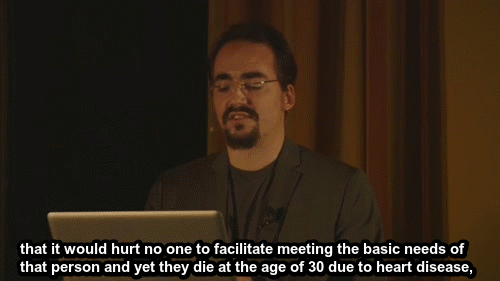


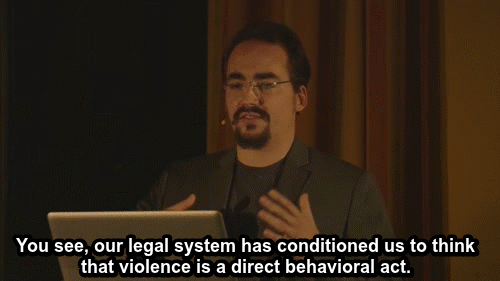
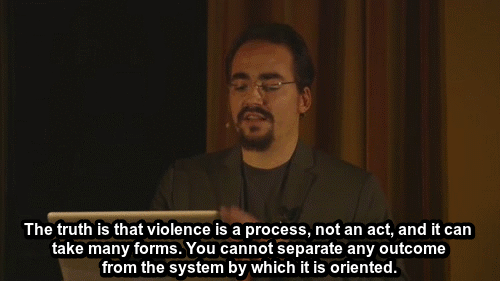
Peter Joseph on structural violence, from this video.
353K notes
·
View notes
Audio
These precious commentaries were on the Pioneer Special Edition LaserDisc. A different commentary by Foley is on the DVD release. It’s a pity they couldn’t get the Jack Lemmon commentary from the old LaserDisc. Well, Cinephilia & Beyond and filmschoolthrucommentaries comes to the rescue (NOTE: For educational purposes only.) Needless to say, the special edition Blu-ray+DVD of ‘Glengarry Glen Ross’ is a must have (Amazon).
LD commentary 1: Director James Foley LD commentary 2: Actor Jack Lemmon [mp3]
“Listening to this veteran player speak for an hour and a half on his craft makes you realise how fluffed-up and pretentious most ‘modern actor’ commentaries are by comparison. Lemmon views acting in a practical way and concedes that you need to have a love for it; he not only discusses GLENGARRY but finds parallels to several of his other films as well, along with several amusing anecdotes about the old studio system. Ever the consummate professional, he never “names names” when he has anything remotely negative to say. To my knowledge this is only one of two audio commentaries recorded by Lemmon — if you like this actor you’re guaranteed to enjoy listening to him reminisce.” —Herschel Gelman
How many passes does it take to create perfect dialogue? That’s a really good question. I’m not sure I know the answer. I do it fairly spontaneously, and then sometimes, for various reasons, it has to be recrafted. I used to be really good at that, but it gets more difficult as I get older just because my brain is failing. I have less brain cells because long before any of you guys were born, there was something called the ‘60s. That’s where the brain cells were. —The Writer’s Craft: A David Mamet Interview
David Mamet: The Playwright Directs is a short television documentary produced in 1976 where Mamet tries to convey his rehearsal methods for a play. He uses two early short plays as examples, ‘Dark Pony’ and ‘Reunion.’ Mamet is such a no-nonsense individual who never minces words with his cast, that it’s fascinating to see him direct his actors in a fast-paced, hectic manner like a character out of one of his own plays. The end result is a lesson in how Mamet directs his actors and the importance of giving his characters a motivation and how that affects their actions in the drama.
MAMET’S THEATRICAL ROOTS
“You gotta put your ass on the line and use the audience. Period. The reason that theatre evolved that way was because the progress of the theatre on the stage aped and recapitulated the mechanism of human understanding, which is: thesis, antithesis and synthesis. And one learns to lead the audience ahead by giving them just enough information to make them interested, but not enough information so that they warrant surprise and punchline. Which is the way a joke is structured.”
MAMET ON DIRECTING
“Your chances of making a living or making a better living are increased by writing something that you would want to write badly enough that you would actually go out and raise the money to direct it. You’re much better to do that because otherwise you’re just going to waste twenty years waiting for the good will of your inferiors. If you really, really want to make a film—go film it for God’s sake, go steal a camera and get it done rather than trying to interest some second-class mind to help make your script a little bit worse.”
MAMET ON EXPOSITION
“The trick is—never write exposition. That’s absolutely the trick. Never write it. The audience needs to understand what the story is, and if the hero understands what he or she is after then the audience will follow it. The ancient joke about exposition used to be in radio writing when they’d say, ‘Come and sit down in that blue chair.’ So, that to me is the paradigm of why it’s an error to write exposition. Then exposition came out of television, ‘I’m good, Jim, I’m good. There’s no wonder why they call me the best orthopedic surgeon in town.’ Right? And now the exposition has migrated or metastasized into the fucking stage direction. ‘He comes into the room and you can just see he’s the kind of guy who fought in the Vietnam War.’ So the error of writing exposition exists absent even the most miniscule understanding of the dramatic process. You gotta take out the exposition. The audience doesn’t care. How do we know they don’t care? Anybody ever come into the living room and see a television drama that was halfway through? Did you have any difficulty understanding what was going on? No. The trick is to leave the exposition out and to always leave out the ‘obligatory scene.’ The obligatory scene is always the audition scene, so when you see the movie, not only is it the worst scene in the movie—it’s also the worst acted scene in the movie. Because the star has to do their worst, most expository acting to get the job. Leave out the exposition; we want to know what’s happening next. All our little friends… will say to you at one point, ‘You know, we want to know more about her.’ And that’s when you say, ‘Well, that’s what you paid me for—so that you would want to know more about her.’”
MAMET ON CON-ARTIST TALES
“In every generation the cunning rediscover that they can manipulate the trustful and they count this as the great, great wisdom of all time.”
PROFESSOR MAMET’S READING ASSIGNMENT
“I suggest that everyone get Francis Ferguson’s edition of Aristotle’s Poetics. Read it once—it’ll make the point—and then retire to your typewriters. [Screenwriting’s] all about working on it and working on it until it comes out even. There’s really no magic to it. There really isn’t. They say that Bach could improvise a toccata and I’m sure he could, but I don’t think anybody can improvise a screenplay. Joseph Campbell’s Hero of a Thousand Faces is another great book where he goes through the Hero’s Journey and explains that all Heroes Journeys are alike whether it’s Jesus or Moses or Ghandi or Martin Luther King, Jr. or Dumbo. Every Hero’s Journey is exactly alike because that’s the way that we understand our own Hero’s Journey—which is the story of our own life. We’re given a problem, we disregard the problem, it’s given to us again, and finally we’re called to an adventure and we find ourselves unprepared and we find ourselves in the belly of the beast like Jonah, who’s eventually spewed onto a foreign land in the second act and little friends come and help. It’s true. Whether it’s Mickey the Mouse or whether it’s John the Baptist or whether its Joshua—it’s the same thing according to Joseph Campbell. The little friends come and eventually the problems of the second act rectify themselves so that the third act is a reiteration of the first problem in a new form. Not how do I live with the fact that the taskmaster is killing the Jew, but how do I bring the Torah to the Jewish people? So the third act becomes the quest for the goal and eventually the hero achieves his or her goal and that’s the end of the movie that started since frame one.”
David Mamet’s screenplay for ‘Glengarry Glen Ross’ is the best screenwriting school you can ever get. (NOTE: For educational purposes only.) Thanks to samgolightly and the great folks at Write to Reel, the BEST screenwriting community our there.
Reads/Watches/Listens:
The writer’s craft: a David Mamet Interview
10 screenwriting tips from ‘Glengarry Glen Ross’
The professional world in David Mamet’s ‘Glengarry Glen Ross’
David Mamet papers now open for research
For more film related items throughout the day, follow Cinephilia & Beyond on Twitter. Get Cinephilia & Beyond in your inbox by signing in. You can also follow our RSS feed. Please use our Google Custom Search for better results. If you enjoy Cinephilia & Beyond, please consider making a small donation to keep it going:
// <![CDATA[ // ]]>
314 notes
·
View notes
Photo


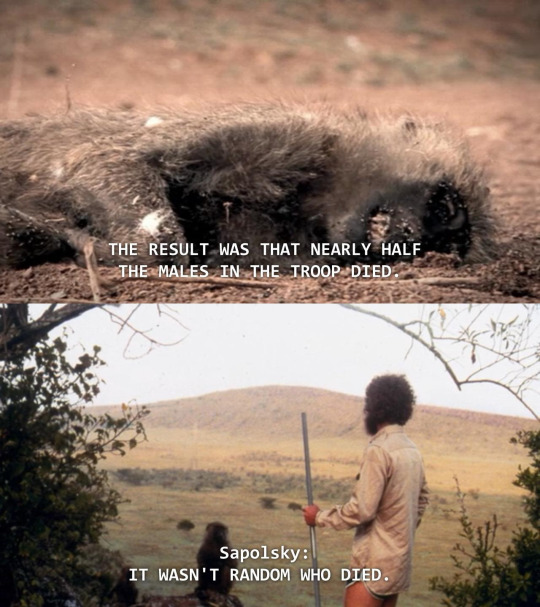
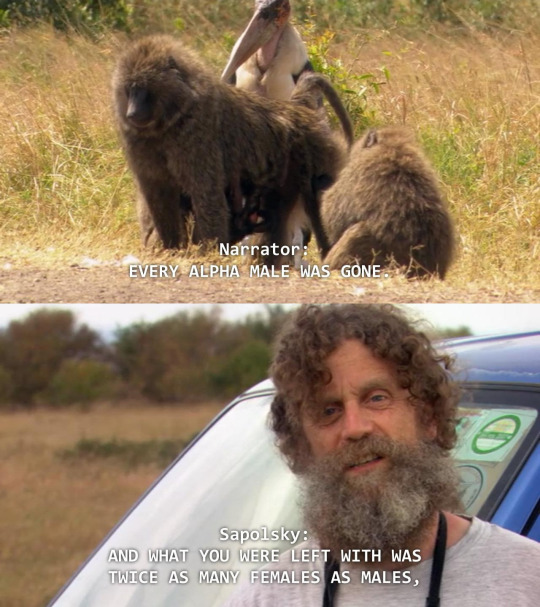
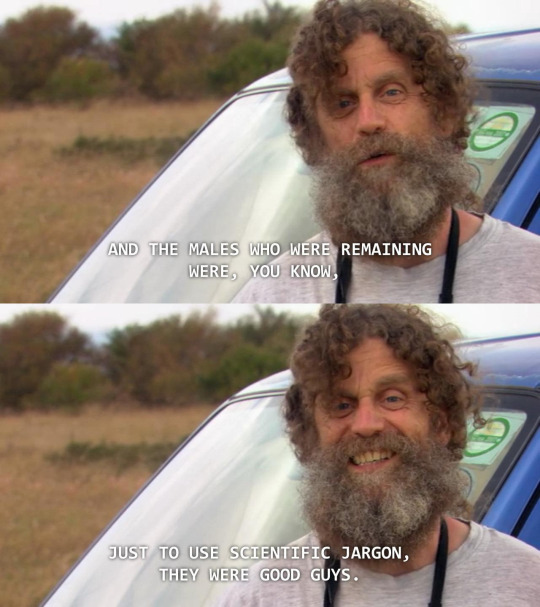



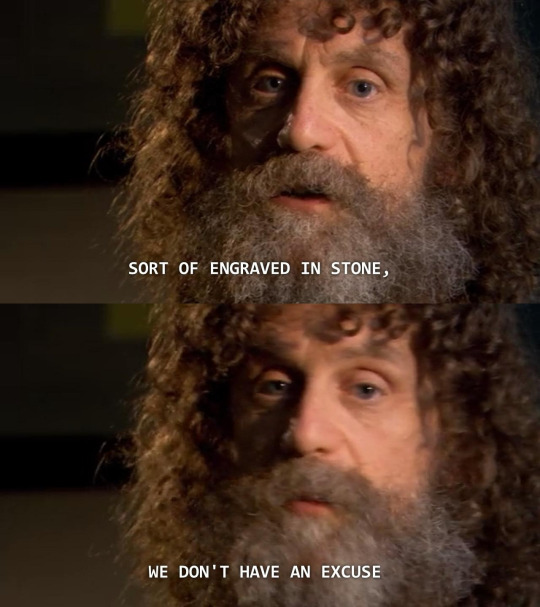

Robert Sapolsky about his study of the Keekorok baboon troop from National Geographic’s Stress: Portrait of a Killer.
288K notes
·
View notes
Text
Beyonce lost. Lana lost. Justin lost. Taylor lost. Ed lost. Kendrick lost.
So basically, I’m lost because I thought the Grammys were about awarding talented artists?
43K notes
·
View notes
Quote
But the 8-hour workday is too profitable for big business, not because of the amount of work people get done in eight hours (the average office worker gets less than three hours of actual work done in 8 hours) but because it makes for such a purchase-happy public. Keeping free time scarce means people pay a lot more for convenience, gratification, and any other relief they can buy. It keeps them watching television, and its commercials. It keeps them unambitious outside of work. We’ve been led into a culture that has been engineered to leave us tired, hungry for indulgence, willing to pay a lot for convenience and entertainment, and most importantly, vaguely dissatisfied with our lives so that we continue wanting things we don’t have. We buy so much because it always seems like something is still missing.
Your Lifestyle Has Already Been Designed (via weedbrain)
(via paris2london)
Add all of SCHOOL, from K-grad school, and everyone is on a hamster wheel forever.
(via kissingunderspiderwebs)
232K notes
·
View notes
Quote
Whether it can be altered or not, whether it's right or wrong, landlordism is one of the causes of poverty,' Owen repeated. 'Poverty is not caused by men and women getting married; it's not caused by machinery; it's not caused by "over-production"; it's not caused by drink or laziness; and it's not caused by "over-population". It's caused by Private Monopoly. That is the present system. They have monopolized everything that it is possible to monopolize; they have got the whole earth, the minerals in the earth and the streams that water the earth. The only reason they have not monopolized the daylight and the air is that it is not possible to do it. If it were possible to construct huge gasometers and to draw together and compress within them the whole of the atmosphere, it would have been done long ago, and we should have been compelled to work for them in order to get money to buy air to breathe. And if that seemingly impossible thing were accomplished tomorrow, you would see thousands of people dying for want of air--or of the money to buy it--even as now thousands are dying for want of the other necessities of life. You would see people going about gasping for breath, and telling each other that the likes of them could not expect to have air to breathe unless they had the money to pay for it. Most of you here, for instance, would think and say so. Even as you think at present that it's right for so few people to own the Earth, the Minerals and the Water, which are all just as necessary as is the air. In exactly the same spirit as you now say: "It's Their Land," "It's Their Water," "It's Their Coal," "It's Their Iron," so you would say "It's Their Air," "These are their gasometers, and what right have the likes of us to expect them to allow us to breathe for nothing?" And even while he is doing this the air monopolist will be preaching sermons on the Brotherhood of Man; he will be dispensing advice on "Christian Duty" in the Sunday magazines; he will give utterance to numerous more or less moral maxims for the guidance of the young. And meantime, all around, people will be dying for want of some of the air that he will have bottled up in his gasometers. And when you are all dragging out a miserable existence, gasping for breath or dying for want of air, if one of your number suggests smashing a hole in the side of one of the gasometers, you will all fall upon him in the name of law and order, and after doing your best to tear him limb from limb, you'll drag him, covered with blood, in triumph to the nearest Police Station and deliver him up to "justice" in the hope of being given a few half-pounds of air for your trouble.'
The Ragged Trousered Philanthropists
0 notes
Quote
Sometimes it seems that (a) 95% of idea-based writing on the internet is just plausible-sounding polemics by people with a superficial and often incorrect understanding of their subject, and (b) the filter applied to this writing emphasizes the contrarian, sensational, but also least informed. The internet is fucking yellow.
0 notes
Quote
History is ultimately about the cannabalization of the Top 10 wealthiest by the next 90 wealthiest. The rest is just footnotes. This is the essential pattern that emerges from Howard Zinn's A People's History of the United States. The American Revolution was just a war between the New Rich (George Washington, Thomas Jefferson, et. al) and a few British landowners. The Civil War was just a war between the New Northern Rich and the few slaveholding landowners who owned most of the South. Continuing with this pattern, the Great Recession of 2007 was just a war between Goldman Sachs and Lehman Brothers (with Goldman Sachs winning, gloriously). Cash is inherently bubble-producing. "Nothing makes money like money," as the saying goes, and so as the rich become the ultra-rich, they eventually create a tumor. The situation is unsustainable, and when the bubble pops, the second layer of wealthy individuals are ready to reclaim the seized territory or government handouts. The rest of history is simply about the minimal goods that the rich can give the poor to keep the system in tact.
Phil Dhingra
0 notes